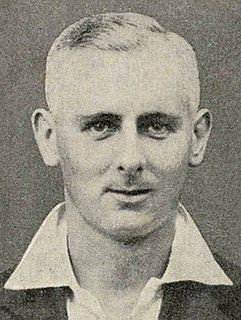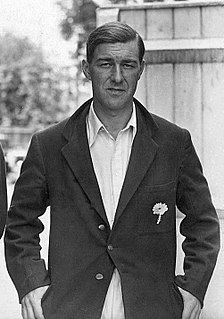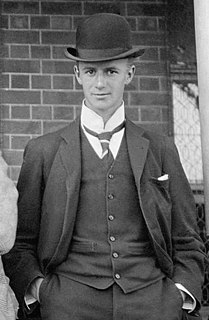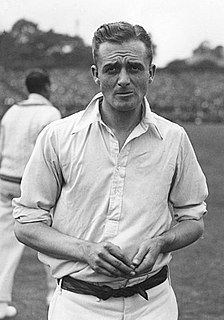Related Research Articles

Hedley Verity was a professional cricketer who played for Yorkshire and England between 1930 and 1939. A slow left-arm orthodox bowler, he took 1,956 wickets in first-class cricket at an average of 14.90 and 144 wickets in 40 Tests at an average of 24.37. Named as one of the Wisden Cricketers of the Year in 1932, he is regarded as one of the most effective slow left-arm bowlers to have played cricket. Never someone who spun the ball sharply, he achieved success through the accuracy of his bowling. On pitches which made batting difficult, particularly ones affected by rain, he could be almost impossible to bat against.

Norman Walter Dransfield Yardley was an English cricketer who played for Cambridge University, Yorkshire County Cricket Club and England, as a right-handed batsman and occasional bowler. An amateur, he captained Yorkshire from 1948 to 1955 and England on fourteen occasions between 1947 and 1950, winning four Tests, losing seven and drawing three. Yardley was named Wisden Cricketer of the Year in 1948 and in his obituary in Wisden Cricketers' Almanack, he was described as Yorkshire's finest amateur since Stanley Jackson.

Charles Lucas Townsend was a Gloucestershire cricketer. An all-round cricketer, Townsend was classically stylish, left-handed batsman, who was able to hit well despite his slender build. His off-side strokes were particularly effective, and his driving allowed him to score at a consistent pace throughout his major innings. In his younger days Townsend was also a spin bowler, who relied chiefly on a big break from leg but could also turn the ball the other way. He was often extremely difficult on sticky wickets but very rarely effective on good ones.
Sir Wesley Winfield Hall is a Barbadian former cricketer and politician. A tall, strong and powerfully built man, Hall was a genuine fast bowler and despite his very long run up, he was renowned for his ability to bowl long spells. Hall played 48 Test matches for the West Indies from 1958 to 1969. Hall's opening bowling partnership with fellow Barbadian Charlie Griffith was a feature of the strong West Indies teams throughout the 1960s. Hall was one of the most popular cricketers of his day and was especially popular in Australia, where he played two seasons in the Sheffield Shield with Queensland.
Herbert Leslie Jackson, known as Les Jackson, was an English professional cricketer. A fast or fast-medium bowler renowned for his accurate bowling and particular hostility on uncovered wickets, he played county cricket for Derbyshire from 1947 to 1963, and was regularly at, or near the top of, the English bowling averages. He played in only two Test matches for England, one in 1949 and a second in 1961. Jackson's absence from Test cricket was largely because his batting was so underdeveloped: his highest first-class score was 39 not out, and he reached 30 on only two other occasions. Between July 1949 and August 1950, Jackson indeed played fifty-one innings without reaching double figures, a number known to be exceeded only by Jem Shaw, Nobby Clark, Eric Hollies (twice), Brian Boshier and Mark Robinson. His leading competitors like Trueman, Tyson, and even teammate Gladwin were far better batsmen.

Roy Kilner was an English professional cricketer who played nine Test matches for England between 1924 and 1926. An all-rounder, he played for Yorkshire County Cricket Club between 1911 and 1927. In all first-class matches, he scored 14,707 runs at an average of 30.01 and took 1,003 wickets at an average of 18.45. Kilner scored 1,000 runs in a season ten times and took 100 wickets in a season five times. On four occasions, he completed the double: scoring 1,000 runs and taking 100 wickets in the same season, recognised as a sign of a quality all-rounder.

George Gibson Macaulay was a professional English cricketer who played first-class cricket for Yorkshire County Cricket Club between 1920 and 1935. He played in eight Test matches for England from 1923 to 1933, achieving the rare feat of taking a wicket with his first ball in Test cricket. One of the five Wisden Cricketers of the Year in 1924, he took 1,838 first-class wickets at an average of 17.64 including four hat-tricks.

Thomas Bignall Mitchell was an English first-class cricketer who played for Derbyshire between 1928 and 1939.
Richard Pollard was an English cricketer born in Westhoughton, Lancashire, who played in four Test matches between 1946 and 1948. A fast-medium right-arm bowler and a lower-order right-handed batsman who made useful runs on occasion, he played for Lancashire between 1933 and 1950, taking 1,122 wickets in 298 first-class matches; he is 10th highest wicket-taker for Lancashire.
John David Frederick Larter is a former Scottish cricketer, who played in ten Tests for England from 1962 to 1965.

Albert Edward Ernest Vogler was a South African cricketer. A leading all-rounder skilled both at batting and bowling, Vogler played cricket in South Africa prior to becoming eligible to play for Middlesex County Cricket Club in England after serving on the ground staff of the Marylebone Cricket Club at Lord's. He rose to prominence during the 1906 home Test series and then in England the following year: he was described during the latter as the best bowler in the world by Tip Foster, and named a Wisden Cricketer of the Year.

Cuan Neil McCarthy was a South African cricketer who played in fifteen Tests from 1948 to 1951.
Peter Granville Lee, affectionately known as "Leapy", born at Arthingworth, Northamptonshire, on 27 August 1945, is a former cricketer who played for Northamptonshire and Lancashire. He was a right-arm fast-medium bowler who moved the ball off the seam and became among the most effective bowlers in English county cricket during the 1970s. Presumably because his batting was impotent as shown by his highest first-class score in more than 200 matches being 26, Lee appears never to have been considered seriously for Test cricket. He toured South Africa twice with teams organised by Derrick Robins.
Michael Henry John Allen was an English cricketer who played for Northamptonshire from 1956 to 1963 and Derbyshire from 1964 to 1966.
Francis Prest McHugh was an English first-class cricketer, who played three games for Yorkshire County Cricket Club in 1949, and 92 matches for Gloucestershire from 1952 to 1956.
Christopher Herbert Millington Greetham played first-class cricket for Somerset from 1957 to 1966 as a middle-order batsman and a medium-pace bowler. Greetham was a tall, fair-haired right-handed batsman usually used in Somerset's late middle order and a right-arm seam bowler who, for a couple of seasons in the early 1960s, took enough wickets to be classed as an all-rounder. He was considered a good cover fielder, with a strong and accurate throw.
James Redman played first-class cricket for Somerset as a fast-medium bowler between 1948 and 1953.

Leslie John Todd was an English cricketer. A left-handed all-rounder who at various points in his career bowled left-arm orthodox spin and medium-paced inswingers, he played in 437 first-class matches, the majority for Kent County Cricket Club. Making his debut for the county in 1927, Todd found opportunities limited until 1933 when he scored more than 1,000 runs in a season for the first time. He took over 80 wickets in five successive seasons, completing the double in 1937.

The 1979 Gillette Cup Final was a cricket match between Somerset County Cricket Club and Northamptonshire County Cricket Club played on 8 September 1979 at Lord's in London. It was the seventeenth final of the Gillette Cup, which had been the first English domestic knock-out competition between first-class sides. Northamptonshire had won the competition in 1976; Somerset were playing their second consecutive final, having lost to Sussex in 1978.
Thomas Jayes was an English first-class cricketer who played for Leicestershire between 1903 and 1911. He was born and died at Ratby, Leicestershire. Jayes was a right-arm fast bowler and a hard-hitting lower middle-order right-handed batsman; unusually for fast bowlers of the era when he played, he was also rated as a good fielder.
References
- ↑ Preston, Norman (editor); Wisden Cricketers' Almanack , Ninety-Sixth Edition (1959); pp. 683–684
- ↑ Preston, Norman (editor); Wisden Cricketers' Almanack, Ninety-Seventh Edition (1960); pp. 698–699
- ↑ Preston, Norman (editor); Wisden Cricketers' Almanack, Ninety-Eighth Edition (1961); pp. 700–701
- ↑ Derbyshire v Pakistan Eaglets in 1963
- ↑ Preston, Norman (editor); Wisden Cricketers' Almanack, One Hundred and Second Edition (1965); p. 350
- ↑ Derbyshire v Marylebone Cricket Club in 1970